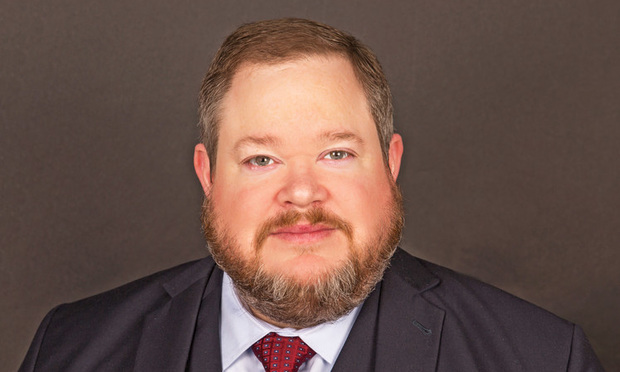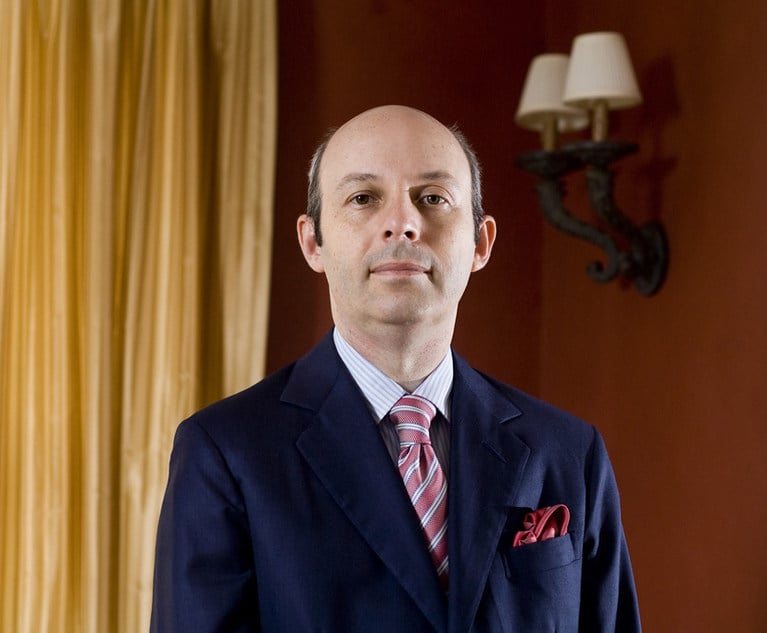Appellate Lawyer of the Week: Houston Attorney Helps Protect a Small Part of Tony Buzbee's Huge Verdict
David George was brought in on appeal of a stunning $159 million jury verdict for a group of six laborers severely burned, and one of them killed, in a 2012 explosion at a Valero refinery.
April 05, 2018 at 01:10 PM
5 minute read

After well-known plaintiff attorney Tony Buzbee won a stunning $159 million jury verdict for a group of six laborers severely burned, and one of them killed, in a 2012 explosion at a Valero refinery, he turned to Houston lawyer David George to protect the victory on appeal.
Technically, all George had to do was defend 6 percent of the verdict on appeal for it to be considered a win.
But successfully defending a little slice of a big verdict that was directed at a single party in a multi-defendant case wasn't a simple task, as George found out.
“Even though a small percentage resulted in the judgment, we had to support the entire amount of damages,” said George, a partner in Houston's Baker Wotring. “And Tony did a fantastic job at trial getting testimony from the men and their families and the doctors to give some idea of the horror they went through and the unbelievable suffering that they experienced.”
That slice of the verdict George defended involved Critical Path Resources, a defendant contractor that the Harris County jury had determined was 6 percent responsible for the disaster at the Memphis, Tennessee, refinery.
Critical Path handled the scheduling of the Valero refinery's “turn around”—a period of time during which a refinery is shut down for repairs and maintenance. And the company was one of seven defendants the plaintiffs sued for their alleged role in the explosion.
Specifically, Critical Path was accused of failing to schedule the cleaning of a gas flare line at the refinery. And while all of the other defendants in the case settled with the plaintiffs, Critical Path stood firm, arguing at trial that the negligence leading to the explosion occurred after their work at the refinery had concluded.
While Critical Path was ultimately deemed negligent by the jury, they were found to be only 6 percent at fault for the explosion. However Valero—who'd wisely chose to settle with the plaintiffs before trial, along with five other defendants—was assigned 70 percent responsibility for the explosion.
Critical Path was ultimately assessed $8.4 in damages in a judgment they appealed to Houston's 14th Court of Appeals, arguing that their alleged acts and omissions did not contribute to the plant's explosion.
But George argued for the plaintiffs there was plenty of evidence tying the cause of the explosion to Critical Path's negligence—specifically because they failed to execute a plan to clean the flare line at the refinery.
“We agree that they had a smaller role than others. You don't have a catastrophic explosion at a refinery unless a number of steps are missed,” George said. “And our position was, and the jury's findings were, that Critical Path was a cause of the explosion—but it wasn't the only cause. The main thing they did was, a Critical Path scheduler failed to schedule the cleaning of explosive gases before a line was worked on. And that led to the refinery workers having to scramble to come up with a plan, which failed, and these men were killed and burned.''
The 14th Court recently agreed with George's arguments, concluding there was enough evidence to support the jury's negligence findings against Critical Path.
“A reasonable jury could find that the dangerous situation created by Critical Path's negligent failure to request plans and schedule tasks to isolate and decontaminate the line was that flammable substances remained without sufficient time to plan and execute their safe removal before the job began,” Justice Brett Busby wrote in the March 29 opinion. “The failures … to abate this danger show that Critical Path's negligence did not 'come to rest' before the explosion.”
Justice Kevin Jewell filed a dissenting opinion in the case, noting he would have reversed the judgment because there was no causal link between Critical Path's negligence and the explosion.
Busby's 77-page majority opinion also went into excruciating detail about the injuries the men suffered in the explosion, noting how the heat from the combustion melted their fire-retardant clothing and breathing masks into their skin, and how doctors explained to the mother of the most severely burned worker that it was “better if he were to die” because his burns were so painful. That worker eventually perished from his injuries. The majority decision upheld most of the damage awards.
But in a usual twist to the decision, the 14th Court “suggested” that the damages for the loss of companionship and mental anguish awards to some of the plaintiffs in the case should be reduced by a $1 million remittitur—giving George's clients the option of accepting a lower damage award or having their case remanded for a new trial.
George said his client will accept the $1 million remittitur instead of opting for a new trial—a deal he notes is rarely offered by Texas appellate courts.
“It's pretty rare, and everybody had to look up the rules with them because they don't come up every day,” George said of the remittitur. “But I think it shows the attention to detail the court used. They examined everything, as you can see in the appeal. They were not just rubber-stamping the jury verdict.”
Russell Hollenbeck, a partner in Houston's Wright Close & Barger who represents Critical Path on appeal, did not return a call for comment.
Buzbee said he often engages George to defend large verdicts because he's confident in the appellate lawyer's ability.
“This particular case, as you can see, was very fact intensive,” Buzbee said. “David dove right in and did an incredible job. I'm very proud of the work we all did in this important case.”
This content has been archived. It is available through our partners, LexisNexis® and Bloomberg Law.
To view this content, please continue to their sites.
Not a Lexis Subscriber?
Subscribe Now
Not a Bloomberg Law Subscriber?
Subscribe Now
NOT FOR REPRINT
© 2025 ALM Global, LLC, All Rights Reserved. Request academic re-use from www.copyright.com. All other uses, submit a request to [email protected]. For more information visit Asset & Logo Licensing.
You Might Like
View All
Texas-Based Ferguson Braswell Expands in California With 6-Lawyer Team From Orange County Law Firm
2 minute read

Crypto Entrepreneur Claims Justice Department’s Software Crackdown Violates US Constitution
4 minute read
SCOTUSblog Co-Founder Tom Goldstein Misused Law Firm Funds, According to Federal Indictment
2 minute readTrending Stories
- 1Lawyers: Meet Your New Partner
- 2What Will It Mean in California if New Federal Anti-SLAPP Legislation Passes?
- 3Longtime AOC Director Glenn Grant to Step Down, Assignment Judge to Take Over
- 4Elon Musk’s Tesla Pay Case Stokes Chatter Between Lawyers and Clients
- 5Courts Demonstrate Growing Willingness to Sanction Courtroom Misuse of AI
Who Got The Work
J. Brugh Lower of Gibbons has entered an appearance for industrial equipment supplier Devco Corporation in a pending trademark infringement lawsuit. The suit, accusing the defendant of selling knock-off Graco products, was filed Dec. 18 in New Jersey District Court by Rivkin Radler on behalf of Graco Inc. and Graco Minnesota. The case, assigned to U.S. District Judge Zahid N. Quraishi, is 3:24-cv-11294, Graco Inc. et al v. Devco Corporation.
Who Got The Work
Rebecca Maller-Stein and Kent A. Yalowitz of Arnold & Porter Kaye Scholer have entered their appearances for Hanaco Venture Capital and its executives, Lior Prosor and David Frankel, in a pending securities lawsuit. The action, filed on Dec. 24 in New York Southern District Court by Zell, Aron & Co. on behalf of Goldeneye Advisors, accuses the defendants of negligently and fraudulently managing the plaintiff's $1 million investment. The case, assigned to U.S. District Judge Vernon S. Broderick, is 1:24-cv-09918, Goldeneye Advisors, LLC v. Hanaco Venture Capital, Ltd. et al.
Who Got The Work
Attorneys from A&O Shearman has stepped in as defense counsel for Toronto-Dominion Bank and other defendants in a pending securities class action. The suit, filed Dec. 11 in New York Southern District Court by Bleichmar Fonti & Auld, accuses the defendants of concealing the bank's 'pervasive' deficiencies in regards to its compliance with the Bank Secrecy Act and the quality of its anti-money laundering controls. The case, assigned to U.S. District Judge Arun Subramanian, is 1:24-cv-09445, Gonzalez v. The Toronto-Dominion Bank et al.
Who Got The Work
Crown Castle International, a Pennsylvania company providing shared communications infrastructure, has turned to Luke D. Wolf of Gordon Rees Scully Mansukhani to fend off a pending breach-of-contract lawsuit. The court action, filed Nov. 25 in Michigan Eastern District Court by Hooper Hathaway PC on behalf of The Town Residences LLC, accuses Crown Castle of failing to transfer approximately $30,000 in utility payments from T-Mobile in breach of a roof-top lease and assignment agreement. The case, assigned to U.S. District Judge Susan K. Declercq, is 2:24-cv-13131, The Town Residences LLC v. T-Mobile US, Inc. et al.
Who Got The Work
Wilfred P. Coronato and Daniel M. Schwartz of McCarter & English have stepped in as defense counsel to Electrolux Home Products Inc. in a pending product liability lawsuit. The court action, filed Nov. 26 in New York Eastern District Court by Poulos Lopiccolo PC and Nagel Rice LLP on behalf of David Stern, alleges that the defendant's refrigerators’ drawers and shelving repeatedly break and fall apart within months after purchase. The case, assigned to U.S. District Judge Joan M. Azrack, is 2:24-cv-08204, Stern v. Electrolux Home Products, Inc.
Featured Firms
Law Offices of Gary Martin Hays & Associates, P.C.
(470) 294-1674
Law Offices of Mark E. Salomone
(857) 444-6468
Smith & Hassler
(713) 739-1250






